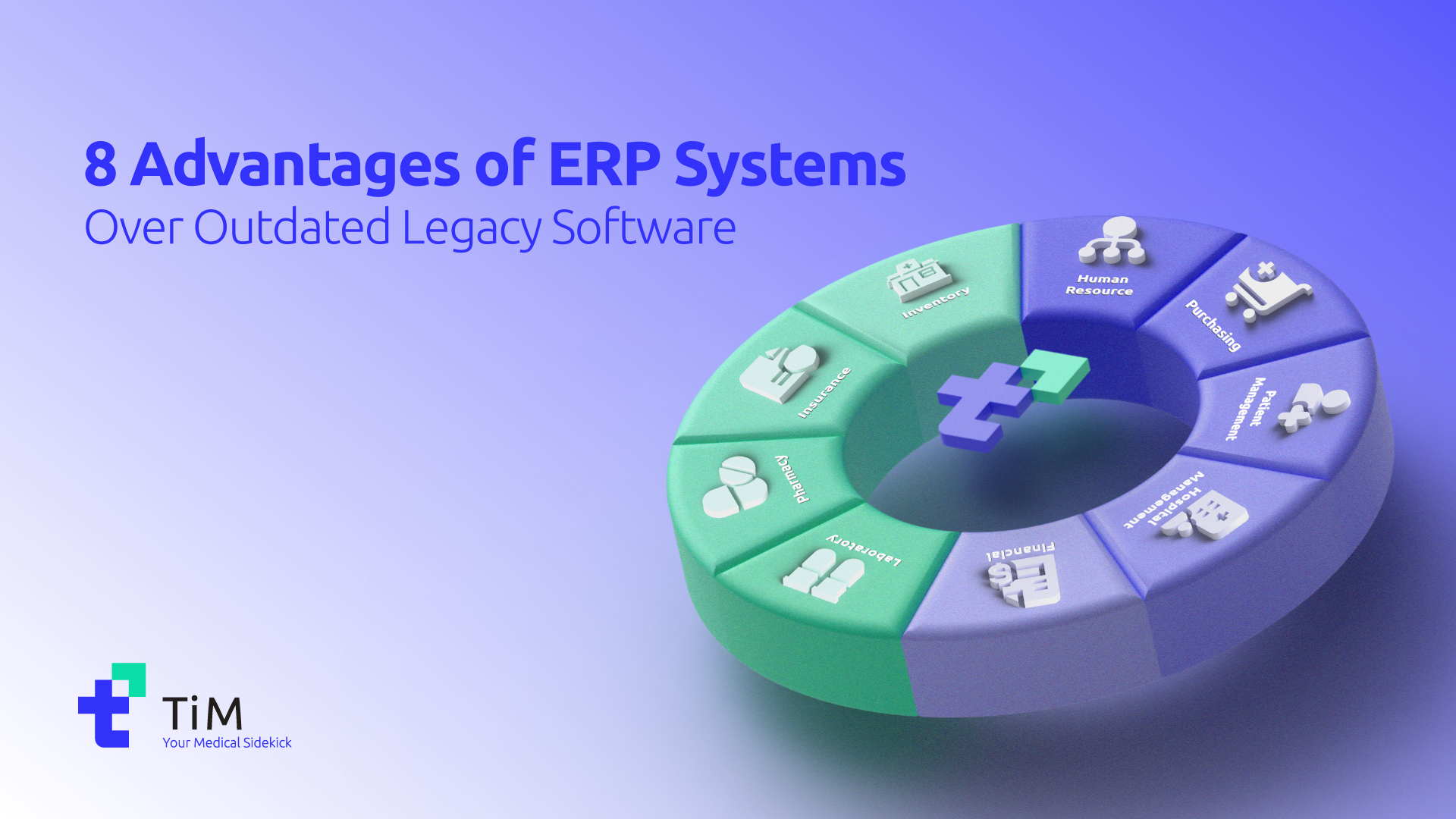
8 Advantages of ERP Systems Over Outdated Legacy Software
Table of Contents
Imagine running your entire business from a single, seamless platform—this is the promise of Enterprise Resource Planning (ERP) systems. Designed to replace outdated, fragmented legacy software, ERPs unify critical business processes, making operations more efficient and decision-making smarter.
In today’s fast-evolving healthcare landscape, clinics and hospitals are increasingly turning to technology to improve operations, streamline patient care, and boost overall efficiency. Legacy systems, often siloed and outdated, struggle to meet these demands, paving the way for ERP systems to take the spotlight.
ERP systems are emerging as a comprehensive solution, offering benefits that often outshine traditional clinical management software.
But why should healthcare organizations choose ERP?
What sets it apart from older systems?
Let’s explore the key differences and benefits.
1. Comprehensive Integration
Traditional clinical management systems often focus on specific functions such as patient scheduling, medical billing, or electronic medical records (EMR).
While these systems can be efficient in their niche, they operate in silos, requiring additional software to manage other functions, leading to fragmented data and inefficiencies.
ERP systems, on the other hand, offer an integrated platform where all aspects of clinical and administrative operations are unified.
From supply chain management and human resources to patient care and billing, ERP ties everything into a single platform, ensuring seamless data flow and eliminating duplication.
2. Scalability
As clinics grow, so do their operational needs. Many traditional clinical management systems lack the flexibility to scale with an expanding business, often requiring costly upgrades or the introduction of new systems to manage additional departments.
ERP systems are designed with scalability in mind. They can handle the needs of a small clinic as well as large healthcare organizations with multiple locations. Whether it’s expanding services, adding users, or integrating new departments, ERP platforms are built to grow alongside the clinic, making them a future-proof investment.
3. Advanced Reporting and Analytics
Data-driven decision-making is vital for modern healthcare, but traditional clinical management systems often offer limited reporting capabilities. In absence of a data driven analysis, most clinics are unable to make the optimal decisions, which affects there financials and operations.
Most modern ERP systems, come with an interactive dashboard and reporting tools that provide clarity in business decision making. With the centralization of data across various modules, ERP systems offer the much needed clarity to the managers. TIM leverages these ERP features to present useful information with ease.
4. Customization
One of the biggest drawbacks of other clinical management systems is their lack of customization. Many are built on rigid frameworks that force clinics to adapt their workflows around the software, rather than the other way around.
ERP systems are highly customizable, allowing clinics to configure the software to match their unique needs. Whether it’s creating specific workflows, customizing dashboards, or adding unique features, ERP offers a level of flexibility that other systems can’t match.
5. Improved Compliance and Security
Healthcare organizations must comply with strict regulations such as HIPAA (Health Insurance Portability and Accountability Act) and GDPR (General Data Protection Regulation). While legacy systems may get the specific job done, but they may not always meet the modern standards required for security and other governmental compliance.
ERP systems are designed with compliance in mind. They offer built-in features like audit trails, role-based access control, and encryption, which help healthcare providers meet regulatory requirements and protect sensitive patient data. Furthermore, ERP systems are regularly updated to ensure they stay ahead of new compliance regulations.
6. Cost-Effectiveness
While traditional clinical management systems may seem cost-effective initially, they often lead to higher long-term expenses due to the need for multiple software licenses, integrations, and upgrades.
ERP systems, although a larger initial investment, provide significant cost savings over time. By consolidating all operational functions into a single system, clinics reduce the need for multiple platforms and vendors, ultimately saving money on software, training, and maintenance.
7. Interdepartmental Collaboration
In many healthcare settings, departments like finance, procurement, and patient care work in silos, leading to communication breakdowns and inefficiencies. Clinical management systems are typically not designed to facilitate collaboration between different departments.
ERP, however, fosters cross-departmental collaboration. By unifying data across the entire organization, ERP allows departments to work together more effectively, sharing real-time information to streamline operations and improve patient care outcomes.
8. Artificial Intelligence and Automation
Modern ERP systems are incorporating advanced technologies like Artificial Intelligence (AI) and machine learning, features that most traditional clinical management systems do not offer.
AI-driven ERP platforms can automate repetitive tasks, provide predictive analytics, and offer intelligent decision-making tools, which boost efficiency and reduce human error.
At TIM, this is one of our key value propositions: we make the process so seamless for the user that interacting with the system feels like talking to a human being. By accessing system data with the right context, the AI can perform the appropriate action on the correct record, ensuring a smooth and intuitive user experience.
While traditional clinical management systems can be effective for managing specific tasks, ERP systems offer a more comprehensive, scalable, and efficient solution for clinics aiming to optimize their operations.
With integrated functionality, advanced analytics, customization options, and cutting-edge technology, ERP systems are positioned to meet the growing needs of healthcare organizations. For clinics looking to streamline processes, improve patient care, and ensure compliance, choosing an ERP system over other clinical management systems, is a strategic move toward long-term success.

